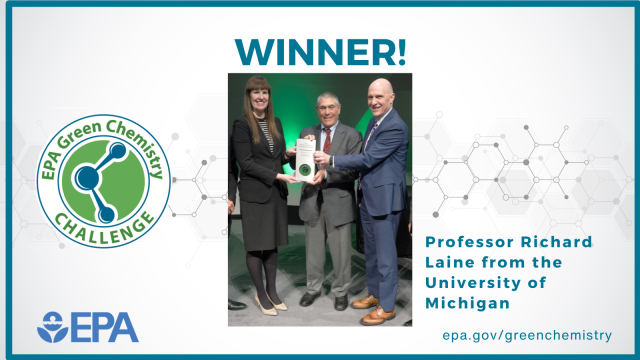Green Chemistry Challenge: 2023 Academic Award
Professor Richard Laine (University of Michigan)

Upcycling/Valorizing a Plentiful Agricultural Waste
Professor Richard Laine from the University of Michigan is being recognized for developing multiple ways to refine agricultural waste into silica-based intermediates, which may be used in materials like lithium-ion batteries and lithium supercapacitors. Millions of tons of agricultural waste (e.g., rice hulls) are burned for fuel every year in the U.S. and worldwide. The resulting rice hull ash is a material containing large amounts of silica and relatively few impurities. Currently, silicon metal is typically produced by heating quartz with a carbon source such as coal. The process developed by Professor Laine operates at lower temperatures, requires less energy and emits less carbon than the current methods.
Summary of Technology:
Millions of tons of agricultural waste (e.g., rice hulls) are burned for fuel value every year in the U.S. and worldwide. The resulting rice hull ash (RHA), which is often landfilled, can contain significant quantities of relatively pure nanocomposite mixtures of carbon and silica. The team at the University of Michigan has developed multiple ways of refining RHA first by washing with diluted hydrochloric acid, then reacting the RHA with hexylene glycol base to produce spirosiloxane. Spirosiloxane can be distilled out directly, leaving silica-depleted RHA. Spirosiloxane can then be used to produce lithium-ion conducting polymers, which have potential for use in solid state batteries. Silicon-depleted RHA is being studied as promising lithium-ion capacitors and can be easily converted to SiC and Si2N2O as anodes for lithium-ion batteries with ≈ 3× the capacity of graphite/Li anodes used currently. These processes offer potential to supplant many of the energy, equipment and CO2 intensive processes involved in the traditional reduction of quartz with anthracite coal to produce Si metal, with production temperatures, energy requirements and carbon footprints much lower than those needed in current industrial processes.
Note: Disclaimer
Return to the list of all winners including the 2023 Award Winners.
